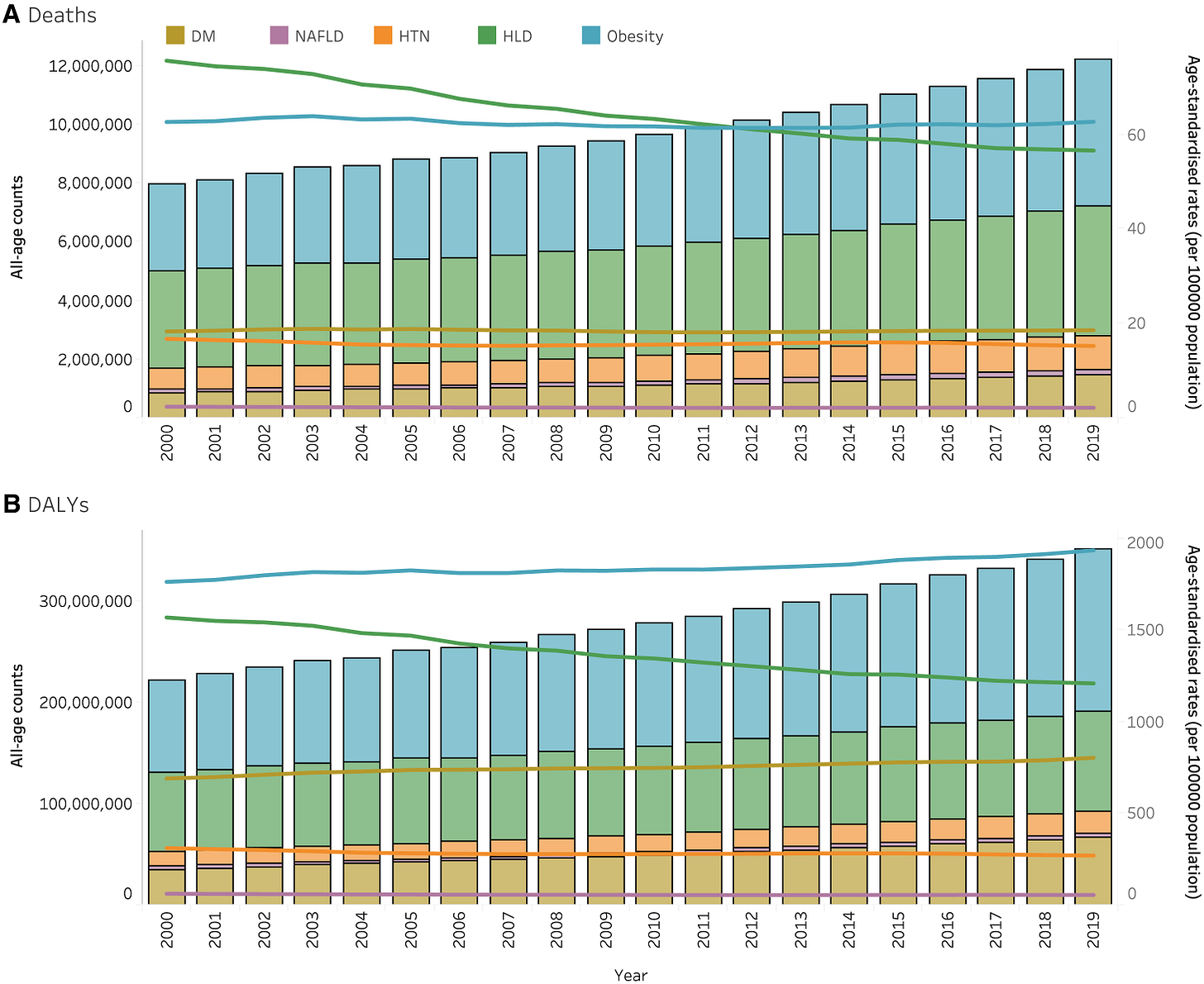The Most Difficult Health and Performance Problem to Solve
Crossing the Knowledge-Action Gap
A recent podcast appearance of mine (link here) prompted me to again discuss something that I see as the biggest, and most important, challenge we have to solve in the health and performance worlds. Whilst it is an issue in the performance world, it is probably less so in the top performers (perhaps that’s the reason they are the top performers), it’s a gargantuan problem in the health world.
The problem?
Crossing the “knowledge-action gap”
In a world where AI and Google exist, effectively as extensions of our body/brain (albeit with a clunky interface called thumbs for now) facts and knowledge have never been worth less (or more ‘democratised’ if you want the glass half full take). As a result, people may anticipate that humanity (or at least the portion with access to all this information) is improving their health and performance, after all the ‘what’ is now widely available. Despite this, though, it’s generally accepted that health of much of the developed world is worsening (at least metabolic disease rates are increasing - see below).

So if the “what” is not a barrier, or at least is no longer a barrier for most people, then why the disconnect. Enter the “knowledge-action gap”
What is the Knowledge-Action Gap?
The “knowledge-action gap” is the gulf between what someone knows they should do (or even what they want to do) and their actual behaviours. In effect, it is the chasm that needs crossing to create behaviour change. For readers familiar with behaviour change and its methodology, the below diagram of the “Transtheoretical Model of Behaviour Change” (TTM) will be all too familiar.
![Figure 25: Stages of Change [30] Figure 25: Stages of Change [30]](https://substackcdn.com/image/fetch/$s_!pmMn!,w_1456,c_limit,f_auto,q_auto:good,fl_progressive:steep/https%3A%2F%2Fsubstack-post-media.s3.amazonaws.com%2Fpublic%2Fimages%2Fa7e85666-079e-4031-839b-9637cb6fde99_1209x1280.png)
The “knowledge-action gap” is effectively my description of where I see people get caught in the TTM stages of change; specifically in the preparation (or maybe the contemplation) stage. It is a reflection of a changing world, specifically as mentioned above, that information is more available and as such awareness and information gathering are no longer significant barriers in many (maybe most) cases.
So What Can People Do to Cross the Knowledge-Action Gap?
The TTM and stages of change are classic teaching for those involved in behaviour change. Those in the space will probably be aware of (or be practicing) motivational interviewing. This is the current gold standard in creation of sustainable behaviour change as I understand it (please let me know if something better has emerged, it’s been a little while since reviewing the literature). I have both learned and used motivational interviewing, I find it to be a great way to coach people through behaviour change but it’s no Jedi mind trick. At best I have seen it nudge people along or through one of the stages in the above model.
Is There Anything Else That Works?
In my experience perspective and/or a significant ‘why’ help cross the knowledge-action gap for many people. For example:
New parents or grandparents suddenly being able to stick to an exercise habit
Injured athletes suddenly doing their rehab/prehab
A person who experiences a significant health scare starting to change their lifestyle
A person at risk of losing their job or missing a promotion changing some of their behaviours
In some regards, these experience shifts can’t be manufactured or engineered, though some of them, such as parenthood (or grandparenthood), are somewhat baked into the human experience.
The second aspect though, the ‘why’, I think can have a large impact. Specifically, at least in my experience, many folks are making many decisions and living in general on autopilot (at least to an extent), never really questioning some of their decisions and behaviours. Worse still, perhaps unaware of their ‘why.’ The result can be unhealthy, low performing (though often not) and unhappy. Identifying, interrogating and understanding their ‘why’ can often lead to significant perspective and behaviour shifts in people, though does need some coaching at times.
I will admit, this is a space I do not spend as much time in at the moment. Partially due to limited time resources and partially by choice - I have found my impact is greater elsewhere. But if there are other solutions or tactics hear please let me know (as usual; comment on Substack or respond to the email).
What Solutions are Potentially on the Horizon?
The simple (read lazy) answer to many of the world’s problems these days seems to be ‘technology’/‘AI’. Cliches often exist, at least in part, for a reason and I do think there’s a potential here for the impact of ‘AI’. Specifically some applications I can see coming are:
Big data informed suggestions. These would be specific behaviour changes for a certain outcome, to have the most impact, for least cost. Given buy-in being both helpful to adherence and success in general I think this could make a big impact. One reason that ‘weight loss’ goals are often a challenge is that significant work needs to be done prior to any success being seen (to reward and reinforce the behaviours) - short circuiting this could have a huge impact.
AI coaching/counselling. There’s interesting research on the benefits people are seeing from AI coaching and counselling in other areas, so there’s no reason to think it wouldn’t be impactful here. This is particularly pertinent given the relatively scripted/algorithmic nature of portions of motivational interviewing (the counter argument is that the human touch here makes a difference if there are different success rates).
There certainly is a big umbrella review suggesting that technologically enabled solutions are effective, at least to a degree, in improving lifestyle behaviours. Though these are not AI enabled and the context for the individuals studies is something I have not looked at (they could be informational apps in people with low education status for example).
I’d love to hear other thoughts, opinions or insights from readers on this challenge we (as a species) face. I am by no means immune to it - I have spent the best part of two decades working on consistency of meditation (to very patchy success). So as usual in the creative space we make the things we would want to consume or indeed look for solutions we need ourselves.
If nothing else, perhaps someone who reads this starts working on the problem and helps create a solution - this is certainly a problem worth solving.
References
Chew, Nicholas W.S. et al. The global burden of metabolic disease: Data from 2000 to 2019. Cell Metabolism, Volume 35, Issue 3, 414 - 428.e3
Frost H, Campbell P, Maxwell M, O'Carroll RE, Dombrowski SU, Williams B, Cheyne H, Coles E, Pollock A. Effectiveness of Motivational Interviewing on adult behaviour change in health and social care settings: A systematic review of reviews. PLoS One. 2018 Oct 18;13(10):e0204890. doi: 10.1371/journal.pone.0204890. PMID: 30335780; PMCID: PMC6193639.
Singh, B., Ahmed, M., Staiano, A.E. et al. A systematic umbrella review and meta-meta-analysis of eHealth and mHealth interventions for improving lifestyle behaviours. npj Digit. Med. 7, 179 (2024). https://doi.org/10.1038/s41746-024-01172-y



I’ve got a somewhat related anecdote to share: I have an athlete I coached a few years ago, ostensibly to prepare for a 50K. He had a busy job, young kid, traveled often. Long story short, he just didn’t do a lot of what was prescribed to him (there was always something else that took precedence, or time wasn’t managed well, etc) and ended up not running the 50K. It didn’t make sense to continue coaching so we stopped. Fast forward 2 years, he has another kid, same busy job, still traveling a bunch. Reaches back out, not because he has a race he wants to prep for, but he was constantly stressed, put on some weight, felt like sh*t more often than not, and couldn’t keep up with his kids. He wanted guidance/structure/accountability and I agreed to work together again because I could tell the “why” was different/more meaningful this time around. In the past 3 months he hasn’t missed an assigned workout (basically has a 60-90’ window from 5:30-7 AM most days), stress and weight both down, feels better, and bikes/hikes/fishes/camps with his boys all the time. The strength of the “why” is a/the key piece of the puzzle.